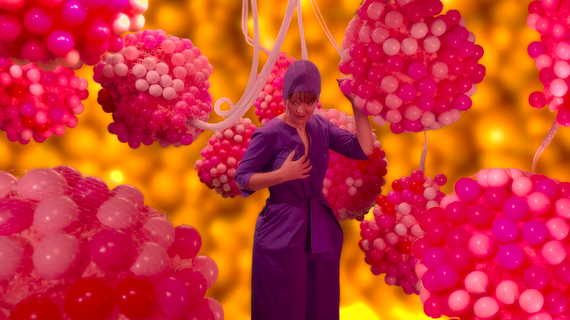
Joanna Callaghan, My Fantastic Voyage (2022), film still.
7 minutes, 4 seconds, 2022
The 1966 feature film Fantastic Voyage is a science-fiction classic of its time, in which a futuristic, forward-looking faith in technology as an instrument of medical intervention co-exists with an Aquarian, almost psychedelic fascination with the body as a source of mystery and wonder. A team of scientists and submariners are miniaturised to microbial scale and injected into the bloodstream of a dying man; their intravenous descent into the recesses of the body rendered as a rollercoaster ride through a fabulous, alien netherworld. In her homage to the film, Joanna Callaghan enlists Fantastic Voyage as a playful lodestar guiding her own personal journey to better understand and visualise her condition after a diagnosis with breast cancer. Grim, grey MRI scans on grim, grey hospital wards morph into a technicolour dreamscape through which Callaghan swims and glides, as if momentarily freed from the gravity of her situation, and the worries and anxieties that accompany it. In this looking-glass universe, the granular details of the body take on strange, hallucinatory forms: healthy cells cluster around her like luxuriant fruit, or festoon the cavities like party balloons, while the black spot of a malign growth is faced down, and then magically dispelled – an act of self-scrutiny and self-care doubling as an augury of self-cure. As the seven-minute video draws to a close, we see Callaghan beaming and dancing alongside her son: their choreographed movements a mix of graceful callisthenics and recuperative exercise. Endearing, affecting and uplifting, My Fantastic Voyage is a bite-sized odyssey that treats the facts of illness with joyful insouciance and a poignant, compelling humanity.
Read Her Fantastic Voyage, an essay in response to Callaghan's work by author and lecturer Jessica Moriarty.
